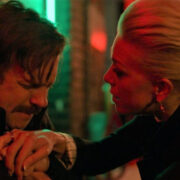Horrific Inquiry: CARRIE (1976)
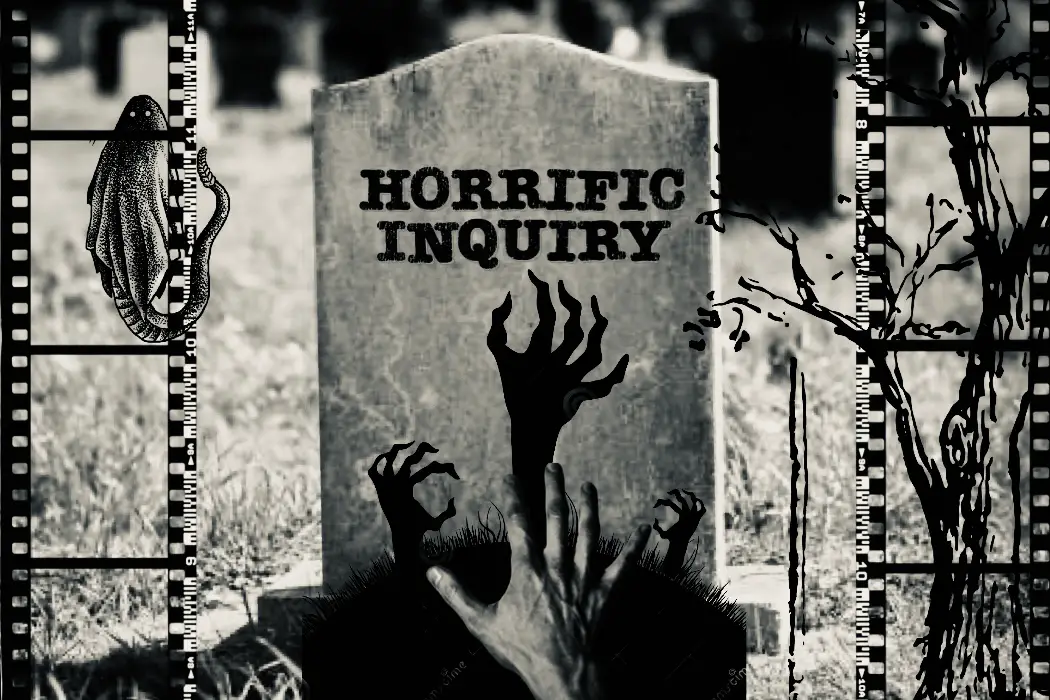
Stephanie Archer is 39 year old film fanatic living in…
Welcome back to the scariest, and at times goriest, column here at Film Inquiry: Horrific Inquiry. Twice a month, I will be tackling all things horror, bringing two films back into the spotlight to terrify and frighten once more. And occasionally looking at those that could have pushed the envelope further. Join us as we dive deep into the heart of horror, but warning, there will be spoilers.
“They’re all going to laugh at you!” – Carrie (1976)
It’s that time of the year again and Senior fever is afoot, moments of finality in full swing. And as yearbooks are signed and sights are set to the future, one final night of magic and young love marks the end of an era. So, in the spirit of prom, Horrific Inquiry has turned its sights to the devastating horrific perfection of Brian De Palma‘s adaptation of Stephen King‘s novel Carrie.
While the film has seen both a sequel and a remake since its release, neither has managed to truly capture the terrifying effect Carrie delivered. For both, bloodier was better. Yet, there was a forgotten sense of the ticking time bomb brewing just below the surface. And not just the time bomb of Carrie and the trauma of the high school experience she endured, but the escalating terror of her classmates that would ignite an unforgettable prom. With De Palma‘s Carrie, there is a constant sense of impending doom – no matter how many times you have seen the film
Effective Foundation of Emotional Investment
It had been years since I had seen the adaptation of Stephen King‘s novel, and I have to admit, I remembered the menstruation of Carrie (Sissy Spacek) coming later in the film. What starts as an awkward teenager on the vollyball court descends into a maddening attack by her peers. The hate of her fellow students is deeply felt as tampons and towels are throw at her, the girls screaming for her to “plug it up”. You will find yourself wondering how this kind of behavior could have been allowed – how this deeply engrained hate had gotten this far out of hand. That is until you see the gym teacher, Miss Collins (Betty Buckley) respond.
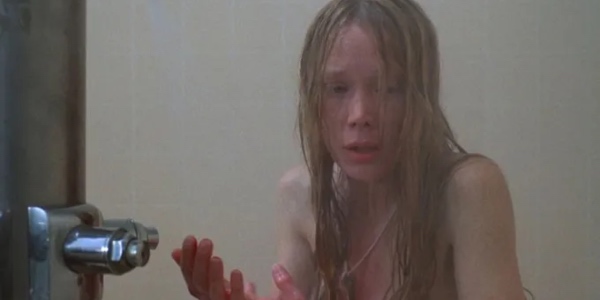
As Miss Collins breaks through the group of girls ganging up on Carrie, she displays her disgust, singling one student, Sue (Amy Irving), in particular. Yet, as she makes her way to Carrie, there is a ruminating hate in her voice – one that she acknowledges later to the principal. Carries panicked screams and huddled mass are met with both hate and physical violence, the teacher slapping her across the face in an attempt to calm her down. And while Carrie does, so too does Miss Collins as she realizes the severity of what is happening – Carrie has no idea what is happening to her.
The opening of the film firmly establishes Carrie’s place within the high school hierarchy – both for students and teachers. As an audience member, you are immediately driven to feel sympathetic for Carrie, hopeful that her growing telekinetic powers can be her saving grace. As she leaves the school, the breadth of the community is expanded beyond the high school. As is the hatred and criticism of Carrie. As she makes her way home, a boy on a bike, weaving in and out of trees, calls to Carrie – “Creepy Carrie! Creepy Carrie!”. Moments later, his bike falls to the ground. De Palma wants us to know it was Carrie, further driving our emotional investment in her story. We want to root for her, her moment of making the bike fall is an accepted form of retribution. As the film builds on her powers and the brutality of her peers, it also continues to drive this commitment to the emotional investment established early on. And as this grows, it gives an almost cathartic release as Carrie brings destruction and purification to the prom, burning it to the ground with everyone in it.
A new kind of mommy dearest
Following Carrie’s moment of karmic deliverance, audiences are given the only scene within the film where Carrie’s mother, Margaret White (Piper Laurie), interacts with others in the community without Carrie present. It feels almost out of place as the interaction has little to do with Carrie or the disastrous discovery of menstruation. Yet, it is a perfectly placed moment that begins to deliver the psychology of Carrie. Where were are now emotionally invested, growing in our ability to root for the destruction of the gym, we too need to understand where this hate of Carrie comes from and the home life that reinforces it.
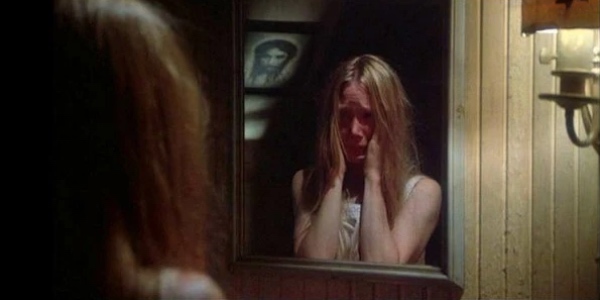
As Margaret arrives at the Snell house, there is disgust in her arrival. While she is reluctantly invited into the home, Mrs. Snell attempts to discuss Carrie, even the idea of her hanging out with daughter Sue. Margaret waves off the idea revealing what Mrs. Snell clearly already knows – she is here to spread the word of the Lord. As a phone call interrupts the interaction, both the audience and Margaret can hear Mrs. Snell speaking with her husband, a disgust between caller and receiver clearly understood, even with only one side of the dialogue. As she offers a donation to Margaret for the cause, it is clear to all that this is just a means to have her move along.
With the lack of decorum to disguise her feelings for Carrie’s mother, Mrs. Snell confirms the ostracization by the community towards Carrie and her mother. One that has been passed down to the children of the community. It is the only time Carrie’s mother interacts outside the home, yet it is just as effective at establishing their place in the hierarchy of the community and reinforcing the one we have just witnessed at the school. It also drives the foundation for the relationship and upbringing of Carrie at home.
Carrie is not afraid to let its audience see the depths of Margaret’s religious devotion. It is also just as committed to showing the abuse this devotion has brought to Carrie. While I’ll touch upon the “Sins of Women” in a moment, the abusive relationship between Carrie and her mother is intense. The film allows a reprieve to the audience by building up the empathy of Sue and the pure hatred of Chris (Nancy Allen) throughout the film maintaining the horror feel, but the terrifying moments of Carrie and her mother hit hard. Many times subtle moments of submission and other explosive forms of rage, audiences watch as Carrie is locked in a closet to pray, accused of sin for normal bodily functions, kept confined to the house, and driven by fear.
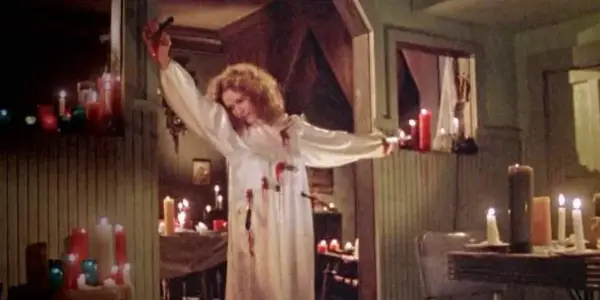
And as Carrie begins to push back, her telekinetic powers infusing a sense of confidence and desire, once again De Palma effectively drives our empathy for Carrie. So much so, when Carrie, by means of self-defense, telekinetically stabs her mother into a door frame, there is relief that her pain and torment have ended. De Palma effectively carries the audience’s emotions as we root for Carrie at the gym to the end of the abuse by her mother. Visually too, the stabbing of her mother mimics the crucifixion Carrie has prayed to for years while locked in the small closet. While both the mass murder of the senior class and her mother can be seen as personal, the death of Carrie’s mother is the most intimate, killing her torment at its roots.
The Sins of Women
Since I last watched Carrie, the film has taken on a new terrifying horror. The last time seen the film, I had never heard of Handmaid’s Tale, Roe V Wade still stood and Bills against discussing periods in schools weren’t being introduced into state legislation. The last time I watched the film, the concept of the Sins of Women was just a belief of wild religious fanatics.
The trauma of receiving her first menstruation and the bullying of her fellow students could have broken anyone. You see Carrie struggling to control her telekinetic powers in its wake, especially as the principal refuses to acknowledge her correct name. Yet, as Carrie’s mother returns home, you see the fear on Carrie’s face. Following a phone call from the school describing what had happened, there is no sympathy for the abuse Carrie endured at the hands of her fellow students or the transition to womanhood. Rather, there is the recitation of the Sins of Women and the curses they bare in retribution of their sins. The curse of blood was put on Eve for her sin of intercourse, as was the curse of childbearing. Now that Carrie is menstruating, it is only because she has committed the sin of sex.

As Carrie embraces the activities of her fellow students and the normalcy of life outside her mother’s house, she begins to break from her cotton and wool attire, embracing satin, makeup, and curls in her hair. She reluctantly accepts the invite of Tommy (William Kate) to the prom and begins to allow her confidence to take hold. As well as her voice. She tells her mother what she wants, her telekinetic powers the only thing she has to physically separate herself from her mother. Though she can not silence her mother’s words. Telling her the devil works through her and chastising her appearance, Carrie’s mother will stop at nothing to have her perceived notion of Christ and womanly behavior understood and obeyed. And when the woman does not bend, the witch must be burned.
Blood Marks the Cursed
As the ostracizing community has never come to help Carrie from her mother or life, Sue and Tommy’s offer to take her to prom is sketchy and almost too good to be true. Tommy, Sue, and the gym teacher Miss Collins are the only individuals in the film who find the ability to not only put Carrie first but to attempt to change the views of others. They break the conformity of a community and embrace a lost lamb. Yet, try as they might, the devil truly is at work, just not through Carrie. The toxicity shared between Chris and Billy (John Travolta) is exemplified by those willing to blindly follow their devious prank. Sadly, they are the unseen force that brings destruction to Carrie and the senior class, their prank igniting a rage that has never been matched.
In a moment that feels reminiscent of The Lord of the Flies, Billy enters a pig farm calling “Piggy, here piggy.” As we watch him brutally murder a pig in cold blood, the length of his and Chris’ hatred for Carrie is shown in full form. The blood on their hands carries through the entirety of the film until they meet their own demise. Their hatred of Carrie becomes an obsession, the hate becoming Carrie’s final curse. As she has come to know the blood of women as a curse brought on by the sin of Eve, the blood poured over Carrie brings about the curse of death on anyone that has harmed her in the past – real or perceived.
This new curse distorts the perception Carrie has of the stage, the shock of the gym’s spectators transferred into a kaleidoscope of hilarity. She has only known pain and torment, the words of her mother the truest thus far. In this moment, for the final time, Carrie defaults to her mother’s words, truly believing that everyone is in fact laughing at her. Everyone has been against her, no matter the amount of kindness that has been allowed to her. We watch as the gym teacher is brutally murdered and the principal electrocuted. These singled-out murders show how deep the violation of trust Carrie feels. How justified she now is in the actions that continue to follow to the film’s conclusion.
The entirety of the prom sequences in Carrie is incredible, from the sweeping entry to the fiery fury of Carrie’s slow and meticulous departure. The film itself is a fast-paced examination of trauma that accelerates into an epic conclusion of hate, freedom, and regret. Grounded by the incredible and unforgettable performance of Sissy Spacek and the masterful direction of De Palma, Carrie is a horror masterpiece that defies convention and proves itself timeless.
Have you seen Carrie? What did you think? Let us know in the comments below!
Watch Carrie
Does content like this matter to you?
Become a Member and support film journalism. Unlock access to all of Film Inquiry`s great articles. Join a community of like-minded readers who are passionate about cinema - get access to our private members Network, give back to independent filmmakers, and more.






